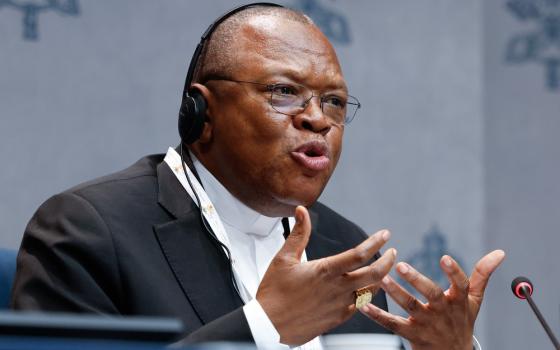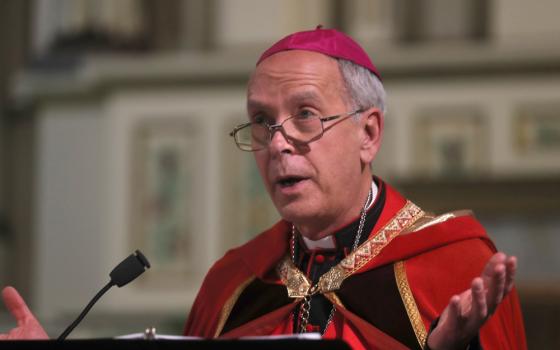I don't know how the new, literal translation of the Mass, which went into effect on the First Sunday of Advent, was received by Catholics this weekend.
However, even if everything went smoothly in most parishes, Catholics, and especially pastors, had a right to complain about the high cost of purchasing new missals and other liturgical books.
The only ones happy are the publishers who stand to make a lot of money and those traditionalist Catholics, inside and outside the hierarchy, who applaud the so-called "reform of the reform."
I hope to write about the general reaction of regular Mass-goers in some future week. This week's column, however, is devoted to the season of Advent itself.t
The First Sunday of Advent is the beginning of the church's liturgical year, but I doubt if any Catholics greeted one another with a "Happy New Year" on Sunday. New Year's Day for most Americans (and I include Canadians in that term) falls on Jan. 1.
Incidentally, when the church followed the Julian calendar before 1582, New Year's Day was celebrated on March 25, the feast of the Annunciation.
For Chinese and other Asian communities, New Year's Day follows the lunar year and falls somewhere between Jan. 10 and Feb. 19. In 2012, the lunar year begins Monday, Jan. 23.
The Jewish New Year (Rosh Hashanah) is also a moveable holiday, observed sometime in late September or early October. This past fall it was celebrated beginning at sundown Wednesday, Sept. 28.
The church's First Sunday of Advent usually occurs in late November, as it did again this year, but it could fall as late as Dec. 3. When that happens, as it did in 2006, the Fourth Sunday of Advent is also Christmas Eve.
Advent, as this column pointed out in 2006 and again in 2009, has never had the same spiritual drawing power as its sister season of Lent. But both seasons are supposed to provide a period of spiritual preparation for major feasts: Christmas and Easter, respectively.
The word "Advent" is derived from Latin (adveniens, or adventus), signifying "a coming toward (or near)." It is meant to focus the church's attention on the three comings of Christ: in the past, at his birth in Bethlehem; in the present, in the community that is especially gathered for the Eucharist; and in the future, at his Second Coming.
Catholics have no problem understanding the first two comings, but the third continues to have an air of unreality about it. Unfortunately, most Catholics focus their attention on the first coming at Christmas. Traditional carols underscore that connection.
However, those who preach during Advent should point out to congregations that the coming of Christ in the present is the most spiritually engaging of his three comings.
The Second Vatican Council's Constitution on the Sacred Liturgy declared that when Catholics gather for the Eucharist, Christ becomes present in the worshiping community itself; in the Word proclaimed by the readers and the priest; in the persons of the various ministries; and uniquely in the sacrament of Holy Communion (n. 7).
Christ also comes to us in the present apart from the Eucharist itself, through what this column once referred to as "the stable door of ordinary human experience."
We are reminded of this again and again in the series of questions posed to Jesus in the parable of the sheep and the goats: "Lord, when did we see you hungry and feed you ... ?" (Matthew 25:37).
Both the righteous (the sheep) and the unrighteous (the goats) will ask him on the day of judgment how they were to have known when he was hungry, thirsty, a stranger, naked, sick or in prison.
"Truly I tell you," he will reply, "just as you did it [or did not do it] to one of the least of these who are members of my family, you did it [or did not do it] to me" (vv. 40, 45).
As this column previously declared, "The message of Advent is that the blessings of the Kingdom will 'come toward' us only to the extent that we 'come toward' those most in need of our love and support."
In other words, Advent is a time for redirecting the expectation of Christ's coming away from "out there" to "right here."t
© 2011 Richard P. McBrien. All rights reserved. Fr. McBrien is the Crowley-O'Brien Professor of Theology at the University of Notre Dame.
| Editor’s Note: We can send you an e-mail alert every time Fr. McBrien’s column, "Essays in Theology," is posted to NCRonline.org. Go to this page and follow the directions: E-mail alert sign-up. If you already receive e-mail alerts from us, click on the "update my profile" button to add "Essays in Theol-ogy" to your list. |


